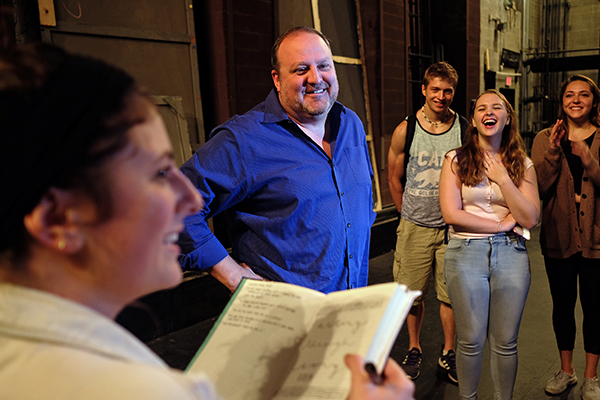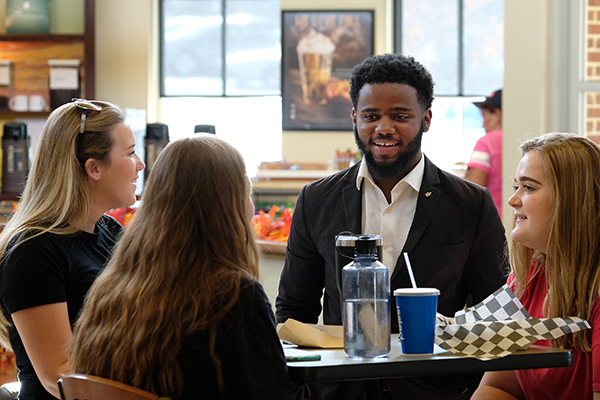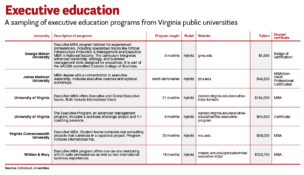‘A different animal’
University began as a seminary and conservatory
‘A different animal’
University began as a seminary and conservatory
Across the state’s higher-ed landscape, Shenandoah University stands apart because of what it does not profess to be.
“Shenandoah is a different animal in higher education in Virginia,” says Tracy Fitzsimmons, president for the past decade at the Winchester-based university. “It was not started as a liberal-arts institution, and we have never been a liberal-arts institution.”
That pronouncement may be unusual for a private, nonprofit institution, but the principle behind it has gained currency since the recession.
Founded in 1875 as a seminary and conservatory, Shenandoah has grown into a university while retaining its mission to align degrees with careers.
“We have always been unapologetic about offering professional training,” Fitzsimmons says. “We love that our students get jobs at graduation and that they are able to contribute broadly to their community.”
But don’t mistake Shenandoah for a technical school. With nearly 4,000 students almost evenly divided between undergraduate and graduate students, SU offers a blend of liberal arts education with career preparation through about 150 academic programs in seven schools.
According to the university, 81 percent of its 2017 graduates are employed or furthering their education, and those who are working reported a median salary of $52,000.
Next year, the university plans to tap into fast-growing and lucrative industries with new majors in e-sports and virtual-reality design.
SU programs are varied. They include, for example, musical theater, criminal justice, business administration and the health professions. Last year, the university expanded a partnership with Inova Health Systems to launch graduate-level programs at a new campus in Fairfax County.
Admission to the highly ranked Shenandoah Conservatory is by audition only.
Back from Broadway

Covert, who saw the school as “just a conservatory” when he was growing up, left Winchester in 1988 for Florida State University. On Broadway, he appeared in “Spamalot,” “Memphis” and “How to Succeed in Business Without Really Trying.”
After “How to Succeed” closed, he decided to try something different and went to Florida State for an adjunct position.
“I fell in love with teaching,” he says. “I fell in love with watching the students and their desire to get better. I even thought to myself, ‘I remember this. I remember all of the hope and none of the cynicism that comes with living in New York.’”
So, when a friend sent him a link for a teaching job at SU, it seemed “kind of kismet.”
Touring the campus during the job interview was like seeing the school for the first time, says Covert, who is in his third year at the university.
“Once you come here and look at the campus and the area surrounding the university and meet the faculty, you’ll be sold,” he says. “There’s a real dedication to care here.”
‘Try different things’

“My first impression wasn’t very good, actually,” he says. During his first semester, he recalls, all he did was go to class until a faculty member advised him to get involved.
Now, Turner gives similar advice to others. “This is the time you want to step out of your comfort zone and try different things,” he says, and at SU “all those opportunities are right in front of you.”
Turner lists a few:
- experiential learning opportunities such as trips to events where sports management students help with game-day logistics for media credentials, corporate suites and team travel schedules.
- internships such the one he had last summer with an auditing firm in Reston.
- and his visit to Pittsburgh to meet with the Steelers marketing department.
One other experience that Turner would like to try is the Global Citizens Project, an expense-paid, study-abroad trip for 50 to 60 students, faculty and staff members who are selected for the program based on their essays. Their destinations are not revealed until the winners are announced at a school assembly.
Turner, a business administration major who also is president of the Alpha Kappa Psi business fraternity, was recruited to play football at SU but found that time commitment interfered with other goals.
“I kind of chose my career over football,” he says. “I no longer play, but I fell in love with the school, so I stuck around.”
Moved in 1960
Shenandoah’s fortunes were not always so bright, though. Its original campus was in Dayton, about an hour south of Winchester. With only 159 students, the school was about to close when business leaders decided in 1960 that Winchester needed a college.
“They plucked us out of Dayton and invited us here, and we have thrived since then,” Fitzsimmons says. Winchester provided the first classroom buildings and some acreage, but the school didn’t have dormitories.
“So, community members opened their doors and invited students to come live with them for the first couple of years,” she says.
Now the university, which is affiliated with the United Methodist Church, has 10 residence halls and satellite locations near Winchester and in Northern Virginia. The sites include Scholar Plaza in Leesburg, which offers graduate programs in business, education and health care.
In January, the university opened the James R. Wilkins Jr. Athletics & Events Center, a 77,000-square-foot indoor facility that serves SU’s 21 teams and can seat 5,000 people for events.
Since 2013, SU also has been steward of the 195-acre Cool Spring River Campus, which serves as an outdoor classroom for history and environmental-studies programs.
Formerly a golf course acquired by the Civil War Trust, the property was the site of the 1864 Battle of Cool Spring. The university is returning the land to its natural state, but it remains open to the public, with the paved cart paths retained for accessibility.
Ties to health systems
The university collaborates with two major health systems: Winchester-based Valley Health and Inova, to train nurses, pharmacists and other health-care professionals. New programs announced last year at the Inova Center for Personalized Health in Fairfax County focus on emerging fields, such as pharmacogenomics — the study of how genes affect a person’s response to drugs.
Specialized health-care training also includes the nursing school’s new Patient Navigation Certificate for licensed registered nurses, which is based on a program developed by Inova Health System.
The program focuses on training nurses as “navigators” to coordinate patient care, especially for those with complex and chronic conditions, says Lisa M. Darsch, a faculty member and the program’s director.
She says the program’s techniques already have shown cost and health benefits for patients who are followed by a trained professional. “Patients no longer fall through the cracks,” she says by email.
Fitzsimmons says such collaborations are mutually beneficial for the health systems and the university. The partnerships help SU expand programs for which there are demonstrated needs, resulting in jobs for graduates and employees for health systems.
SU might be best known for its conservatory and health programs, she says, but it also is investing more in the liberal arts in a way that cuts across majors.
For example, a program might bring in a community expert to explore human trafficking in a forum involving students from a wide range of disciplines. A business major, for example, might address the economics of the problem, while a nursing student would discuss the impact on the body, and a creative writing student would write a poem.
“That’s really about celebrating the breadth of learning — the opening of minds, which is the heart of liberal learning,” she says.
$145.7 million impact
The university has a $145.7 million annual economic impact on Winchester and Frederick County, according to a 2016 study by the consulting firm TischlerBise. The university’s presence supports about 1,570 jobs, an increase of 230 jobs and $56.2 million in economic impact since 2010.
But Fitzsimmons says that’s not the full story. “It’s important to say Winchester is our home, but our backyard extends all the way to Washington,” she says.
And whether they are in a bank, a hospital or on stage, Shenandoah alumni “are the people who keep this country going,” she says. They have “useful, relevant degrees” that prepare them “to do good in the world.”
“I think that’s the magic of our story.”
p

















